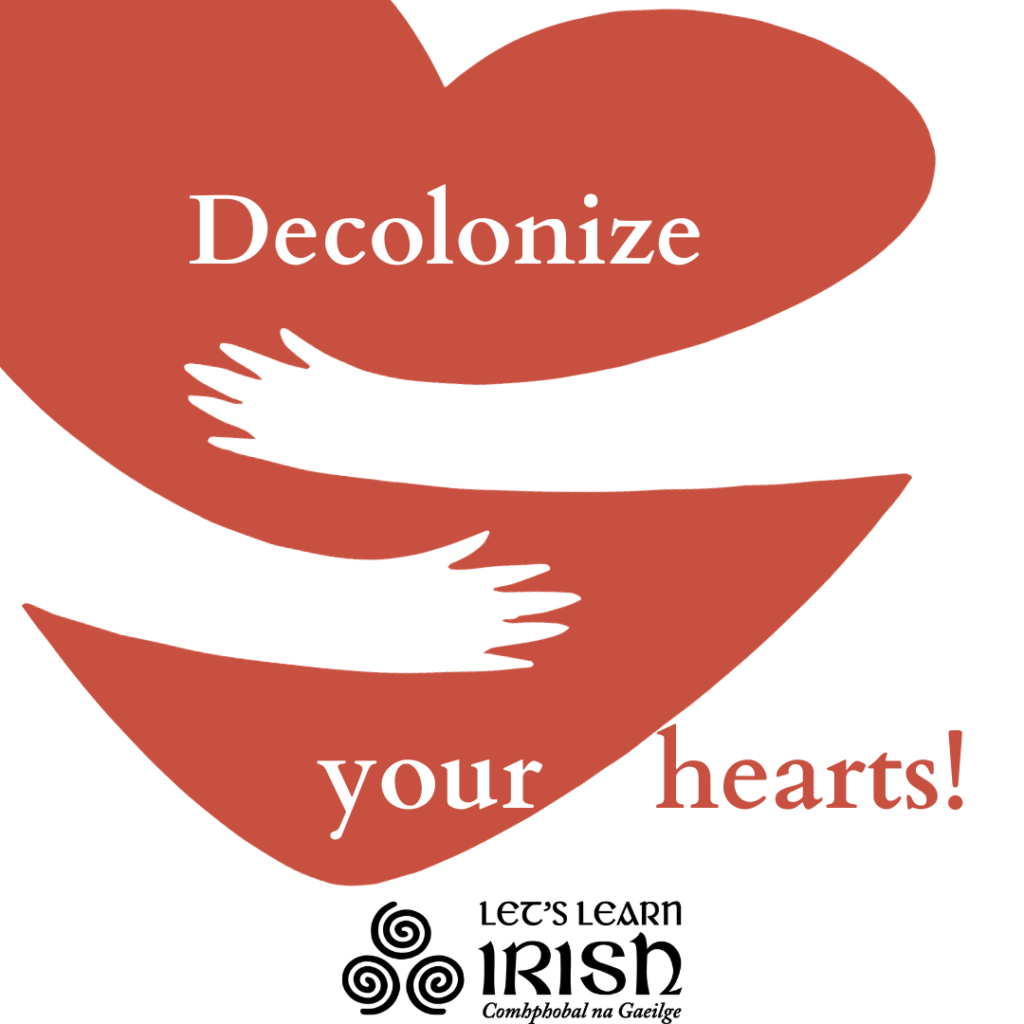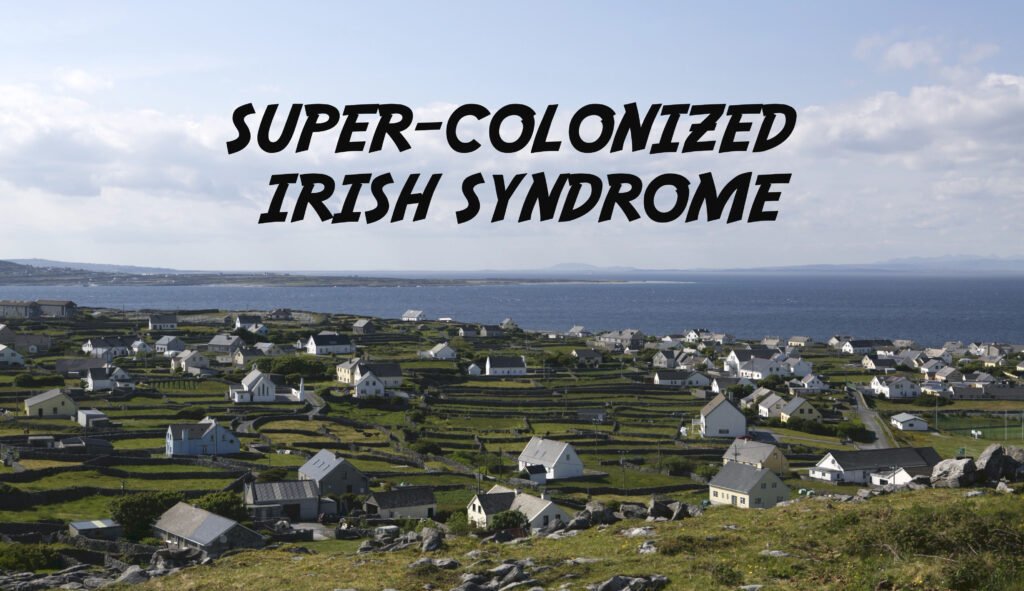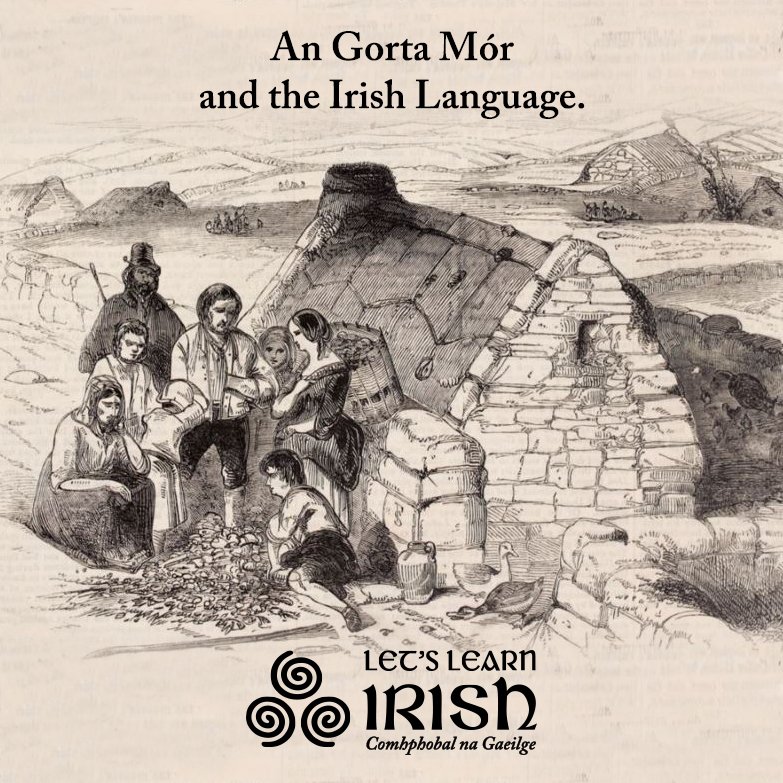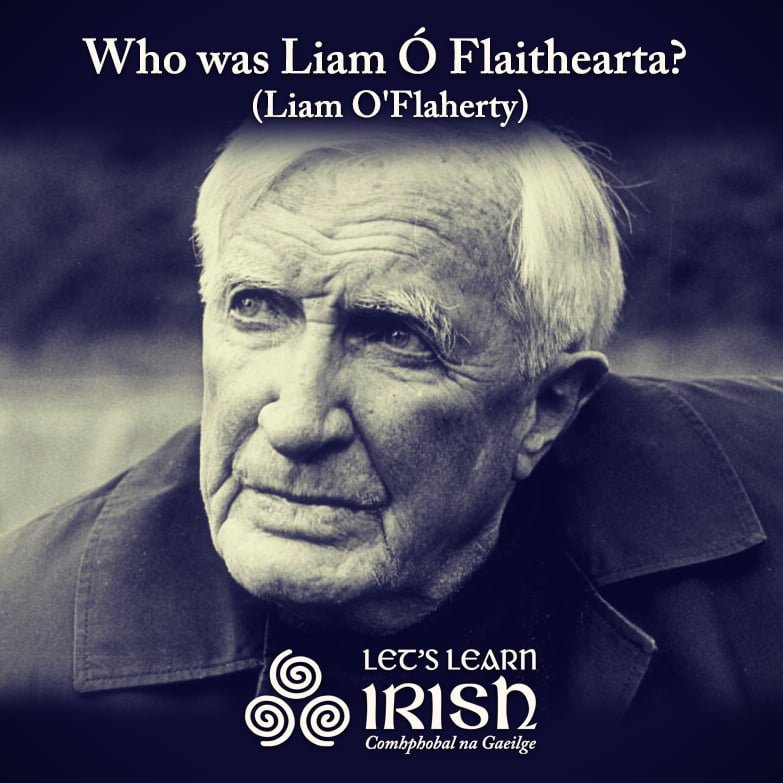The Process of Decolonization
What is the process of decolonization, and how can we go about it? Firstly, I think it’s healthy to recognise that people in pain turn to self-destructive behaviours. In the short term, these behaviours soothe the pain, but long term, they only makes them worse. The effects of colonializm are only now being shown to be disastrous for the survivors and their descendants. Adopting the language of the colonizer exposes the colonised subject to a world-view in which he is a mere subaltern partner. We also see the unfortunate willingness of colonized peoples to internalise unflattering colonial conceptions of themselves, such as barbaric, savage, uncivilised, uneducated etc.
Saoirse Ronan and Stephen Colbert
Unfortunately, Irish people are happy at times to indulge demeaning attitudes towards us. Caoimín De Barra, in his book ‘Gaeilge: A Radical Revolution’, references Saoirse Ronan appearance on the Late Show with Stephen Colbert in 2016 (see video below). Colbert produced a card to show the audience how her name is pronounced. Ronan responded by saying “doesn’t make any sense, it’s a ridiculous name”. Colbert then produced a series of cards with other Irish names for Ronan to pronounce. One of them was Siobhán, which Colbert already knew how to pronounce, but which he found to be “ridiculous, by the way”.
Although they both would argue it was only a bit of fun, this behaviour sadly reinforces old prejudices of the Irish language and Gaelic culture being somewhat backward or “ridiculous”. De Barra argues that Colbert wouldn’t have Shaquille O’ Neal on the show trying to pronounce ‘crazy’ African American names for the general amusement of the crowd. These are classic colonizer’s perceptions of us as savage, barbaric, backwards, uncivilised, and indeed, sub-human. I know people will suggest that I’m over-reacting or being too sensitive, but Tomás Mac Síomóin suggests that a resuscitation of the Irish language cannot be achieved without first mentally decolonizing the nation. This approach echoes Frantz Fanon’s call to discover that the coloniser’s conception of the colonised was nothing but a “hoax” that nonetheless needs to be demolished after colonization, ever before the considerable psychological effects of colonization can be reversed.
The 5 Stages of Decolonization
So how do we begin to repair the damage, how do we possibly decolonize ourselves? The process is inspired by Hawaiian sovereignty activist Hayden Burgess, who also uses the Hawaiian name Poka Laenui. He wrote the essay, “Processes of Decolonization” in which he suggests five stages of decolonization: Recovery, Mourning, Dreaming, Commitment, and Action.
 The first stage of decolonization involves a process of Recovery. Laenui writes that, “This phase sets the foundation for the eventual decolonization of the society”. During this phase “The individual begins to rediscover their indigenous history and recovers lost aspects of their culture such as language and traditions”. I think we are seeing this phase all around us here in Ireland, the very clear renewed interest in the Irish language and all things culturally related to Ireland such as music, dance, history and mythology. Laenui states that, “The natural outgrowth of the first phase is the mourning – a time when a people are able to lament their victimization”.
The first stage of decolonization involves a process of Recovery. Laenui writes that, “This phase sets the foundation for the eventual decolonization of the society”. During this phase “The individual begins to rediscover their indigenous history and recovers lost aspects of their culture such as language and traditions”. I think we are seeing this phase all around us here in Ireland, the very clear renewed interest in the Irish language and all things culturally related to Ireland such as music, dance, history and mythology. Laenui states that, “The natural outgrowth of the first phase is the mourning – a time when a people are able to lament their victimization”.
I believe this second phase of Mourning. This process is essential that, as a people, we truly grieve what has occurred. On an individual level, if something traumatic occurs in my life, it’s important that I really accept what has happened and feel into it without repressing anything. So the same could be said as a nation.
The third phase of decolonization involves the vital task of Dreaming. Laenui believes that dreaming is the most crucial phase in the process of decolonization. This is the stage in which “The full panorama of possibilities are expressed, considered through debate, consultation, and building dreams on further dreams which eventually becomes the flooring for the creation of a new social order”. This phase is the most important and, as in our own lives, it’s important to take time to dream about what we want for our own futures and our society.
Laenui’s fourth phase of decolonization involves Committing to your dreams and making the decision to make them reality.
The final phase of decolonization is the Action phase. Laenui explains that “Consensus on which issues to commit to must occur in the fourth phase before the action phase can follow”.
Do any of these stages resonate with you, or have you felt that you have gone through any of these at any time? Hopefully these steps will go some way to help you on your path of decolonization and language reconnection. Join us at anytime for an Irish course, free workshop or online Comhrá session – bígí páirteach, a chairde!
Workshop, Jan 13th:
Turas Teanga: A Journey of Language Rediscovery
Related Articles:
– An Gorta Mór and the Irish Language.
– Decolonize Your Hearts!
– Super-Colonized Irish Syndrome.
– The Sapir-Whorf Hypothesis and ‘An Bata Scóir’.
Videos:
View Conchobhar Ruadh‘s previous workshops in our Cartlann (Archive).
Bígí páirteach!
Join the online Irish community at LetsLearnIrish.com.
Follow on social media @LetsLearnIrish.





